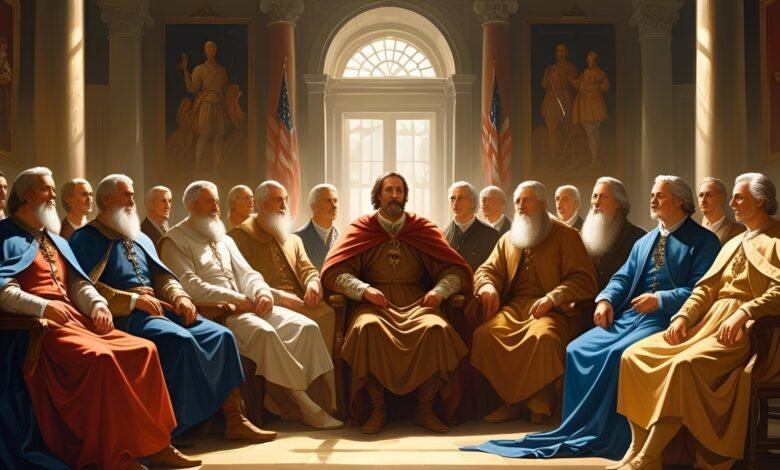
Historical figures are fundamental to comprehensive education and personal development. These remarkable individuals have shaped civilizations, influenced political systems, advanced scientific knowledge, and transformed societies across millennia. For students navigating today’s complex world, studying important historical personalities provides invaluable insights into leadership, innovation, perseverance, and the human condition.
Historical education serves as a bridge connecting past achievements to present opportunities. When students explore the lives of influential people in history, they gain perspective on how individual actions can create lasting change. These famous historical characters demonstrate that ordinary people can achieve extraordinary things through dedication, vision, and courage.
The study of notable historical figures also develops critical thinking skills essential for academic success. Students learn to analyze cause and effect relationships, understand different perspectives, and recognize patterns that repeat throughout history. This knowledge becomes particularly valuable when students encounter similar challenges in their own lives and careers.
Moreover, historical personalities represent diverse backgrounds, cultures, and periods, offering students a global perspective on human achievement. From ancient philosophers to modern civil rights leaders, these individuals showcase the universal human capacity for growth, learning, and positive impact.
In our interconnected world, understanding world history figures helps students become more informed global citizens. They learn about different cultures, political systems, and social movements that continue to influence contemporary society. This knowledge fosters empathy, cultural awareness, and appreciation for human diversity.
1. Alexander the Great (356-323 BCE): The Ultimate Military Strategist
Alexander the Great stands among the most influential military leaders in world history. Born in Macedonia, this ancient historical figure created one of the largest empires ever established, stretching from Greece to India. His military genius and leadership qualities transformed the ancient world and established patterns of conquest that influenced military strategy for centuries.
Alexander’s educational background under the philosopher Aristotle shaped his approach to leadership and governance. He understood that successful conquest required not just military might but also cultural integration and administrative skill. His policy of adopting local customs and marrying into conquered populations demonstrated sophisticated political acumen.
Students studying Alexander learn valuable lessons about strategic thinking, adaptability, and the importance of continuous learning. His ability to inspire loyalty among diverse troops and maintain morale during long campaigns showcases exceptional leadership skills that remain relevant in modern contexts.
The historical impact of Alexander’s conquests extended far beyond military achievements. He facilitated cultural exchange between East and West, spreading Greek culture while absorbing elements from conquered civilizations. This cultural synthesis, known as Hellenization, influenced art, architecture, philosophy, and science throughout the Mediterranean world.
2. Cleopatra VII (69-30 BCE): Political Genius and Cultural Icon
Cleopatra VII represents one of history’s most powerful female leaders and demonstrates the complexity of ancient political systems. As the last pharaoh of Egypt, she navigated treacherous political waters while maintaining Egyptian independence for nearly two decades. Her story challenges students to examine gender roles in history and understand how women in history wielded power despite systemic limitations.
Cleopatra’s intellectual achievements, often overshadowed by popular culture, included fluency in multiple languages and deep knowledge of mathematics, philosophy, and rhetoric. She was a skilled diplomat who understood that Egypt’s survival depended on strategic alliances with Rome while maintaining cultural identity.
Students studying Cleopatra gain insights into political strategy, diplomatic negotiation, and the importance of education in leadership. Her ability to maintain power in a male-dominated world required exceptional intelligence, charisma, and strategic thinking.
The historical significance of Cleopatra extends beyond her political achievements. She represents the intersection of African, Greek, and Roman cultures in the ancient Mediterranean. Her reign marked the end of Ptolemaic rule and the beginning of Roman dominance in Egypt, making her a pivotal figure in the transition between historical periods.
3. Leonardo da Vinci (1452-1519): The Renaissance Polymath
Leonardo da Vinci epitomizes Renaissance achievement and demonstrates the power of interdisciplinary thinking. This famous inventor combined artistic genius with scientific inquiry, creating masterpieces that continue to inspire students centuries later. His approach to learning and creativity provides a model for innovative thinking in modern education.
Da Vinci’s scientific contributions included detailed anatomical studies, engineering designs, and observations of natural phenomena. His notebooks reveal a mind constantly questioning, experimenting, and connecting seemingly unrelated concepts. Students learn that true innovation often occurs at the intersection of different disciplines.
The artistic legacy of Leonardo includes iconic works like the Mona Lisa and The Last Supper, which showcase technical mastery and psychological insight. His artistic techniques influenced generations of painters and established new standards for realistic representation.
Students studying da Vinci understand the importance of curiosity and lifelong learning. His example demonstrates that expertise in one area can enhance understanding in others, encouraging students to pursue diverse interests and make unexpected connections.
4. William Shakespeare (1564-1616): Master of Human Nature
William Shakespeare transformed literature and theater while providing timeless insights into human psychology and social dynamics. His works remain relevant for students because they explore universal themes of love, ambition, jealousy, and moral conflict that transcend historical periods.
Shakespeare’s literary innovations included complex character development, sophisticated plot structures, and poetic language that elevated popular entertainment to high art. He created characters that feel psychologically real and situations that resonate with modern audiences.
The educational value of studying Shakespeare extends beyond literary appreciation. His works develop critical thinking skills, enhance vocabulary, and improve understanding of metaphor and symbolism. Students learn to analyze complex texts and appreciate the power of language to convey meaning.
Shakespeare’s cultural impact extends far beyond the English-speaking world. His plays have been translated into every major language and adapted for different cultures and periods. This global influence demonstrates how great art transcends cultural boundaries.
5. Galileo Galilei (1564-1642): Champion of Scientific Truth
Galileo Galilei represents the courage required to challenge established beliefs in pursuit of scientific truth. This famous scientist revolutionized astronomy and physics while demonstrating the importance of empirical observation over accepted authority.
Galileo’s scientific method emphasized observation, experimentation, and mathematical analysis. His improvements to the telescope allowed unprecedented observations of celestial bodies, providing evidence for the heliocentric model of the solar system. Students learn about the importance of evidence-based reasoning and the willingness to revise beliefs when confronted with new data.
The controversy surrounding Galileo’s work illustrates the tension between scientific progress and established institutions. His trial by the Roman Inquisition becomes a case study in how intellectual courage sometimes requires personal sacrifice for the advancement of human knowledge.
Modern students studying Galileo understand the ongoing importance of scientific literacy and critical thinking. His example demonstrates that progress often requires questioning assumptions and having the courage to pursue truth despite opposition.
6. George Washington (1732-1799): Founding Father and Democratic Leader
George Washington established precedents for democratic leadership that continue to influence political systems worldwide. His role in founding the United States demonstrates how visionary leadership can create lasting institutions and inspire future generations.
Washington’s military leadership during the American Revolution showcased strategic patience and the ability to maintain morale during difficult periods. His decision to relinquish military command and later step down from the presidency established crucial precedents for civilian control of government.
Students studying Washington learn about democratic principles, constitutional government, and the importance of institutional stability. His example demonstrates how personal character and commitment to principles can shape entire political systems.
The global impact of Washington’s leadership extends beyond American history. His model of democratic leadership influenced independence movements and constitutional conventions worldwide, making him a truly international historical figure.
7. Napoleon Bonaparte (1769-1821): Military Genius and Legal Reformer
Napoleon Bonaparte transformed European society through military conquest and legal reform. His Napoleonic Code influenced legal systems worldwide, while his military innovations changed warfare permanently.
Napoleon’s rise to power demonstrates how ability and ambition can overcome social barriers. His military campaigns showcased innovative tactics and strategic thinking that military academies still study today. Students learn about leadership under pressure and the importance of adapting to changing circumstances.
The legal reforms implemented by Napoleon, particularly the Napoleonic Code, established principles of legal equality and property rights that influenced legal systems across Europe and beyond. These reforms demonstrate how political leadership can create lasting institutional change.
Students studying Napoleon understand the complex relationship between individual ambition and historical progress. His story illustrates how transformational leaders can reshape societies while also demonstrating the importance of balancing personal ambition with broader social needs.
8. Abraham Lincoln (1809-1865): Moral Leadership in Crisis
Abraham Lincoln exemplifies moral courage and principled leadership during one of America’s greatest crises. His leadership during the Civil War and his role in ending slavery demonstrate how great leaders navigate moral complexity while maintaining national unity.
Lincoln’s communication skills, particularly his speeches and letters, showcase the power of language to inspire and persuade. The Gettysburg Address and Second Inaugural Address remain models of political rhetoric that combine moral clarity with practical wisdom.
Students studying Lincoln learn about ethical decision-making, crisis management, and the importance of maintaining core principles while adapting tactics to changing circumstances. His example demonstrates how leaders can grow and evolve while remaining true to fundamental values.
The historical legacy of Lincoln extends beyond American history. His model of democratic leadership during a crisis has inspired leaders worldwide who face similar challenges of maintaining democratic institutions under pressure.
9. Marie Curie (1867-1934): Pioneer in Science and Gender Equality
Marie Curie broke barriers in scientific research while advancing human understanding of physics and chemistry. As the first woman to win a Nobel Prize and the only person to win Nobel Prizes in two different sciences, she demonstrates how perseverance and intellectual excellence can overcome social obstacles.
Curie’s scientific discoveries, particularly her research on radioactivity, opened new fields of study and led to advances in medicine and energy production. Her meticulous research methods and dedication to scientific accuracy established new standards for experimental science.
Students studying Curie learn about gender equality in education, scientific integrity, and the importance of persistence in pursuing long-term goals. Her example demonstrates how individual excellence can challenge social assumptions and create opportunities for future generations.
The global impact of Curie’s work extends beyond her scientific contributions. She became a role model for women in STEM fields and demonstrated that scientific excellence recognizes no gender boundaries.
10. Nelson Mandela (1918-2013): Champion of Peace and Reconciliation
Nelson Mandela represents the power of moral leadership to transform societies and overcome seemingly impossible obstacles. His role in ending apartheid in South Africa while promoting racial reconciliation demonstrates how great leaders can choose peace over revenge.
Mandela’s approach to conflict resolution emphasized dialogue, compromise, and the importance of understanding different perspectives. His willingness to work with former enemies while maintaining a commitment to justice provides a model for peaceful social change.
Students studying Mandela learn about social justice, conflict resolution, and the importance of long-term vision in creating sustainable social change. His example demonstrates how individual courage and moral clarity can inspire entire movements.
The international influence of Mandela’s leadership extends far beyond South Africa. His model of reconciliation has influenced peace processes worldwide and demonstrated how societies can overcome deep divisions through moral leadership and mutual understanding.
Conclusion
These ten essential 10 Historical Figures provide students with a comprehensive foundation for understanding human achievement and potential. From ancient military strategists to modern civil rights leaders, these individuals demonstrate that great leadership comes in many forms and emerges from diverse backgrounds and circumstances.
The study of important historical personalities develops critical thinking skills, cultural awareness, and appreciation for human achievement that remain valuable throughout life. These influential people in history show students that individual actions can create lasting positive change and that learning from past examples can inform present decisions.
Also Read: Little League World Series 2025 Guide: Teams, Schedule & Championship Updates






